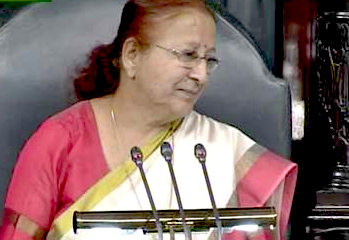 New Delhi, Jun 6: Eight-term member Sumitra Mahajan was on Friday unanimously elected Speaker of the 16th Lok Sabha, becoming the second woman presiding officer of the lower house after her predecessor Meira Kumar.
New Delhi, Jun 6: Eight-term member Sumitra Mahajan was on Friday unanimously elected Speaker of the 16th Lok Sabha, becoming the second woman presiding officer of the lower house after her predecessor Meira Kumar.
71-year-old Mahajan, the longest-serving woman MP, was elected after a motion moved by Prime Minister Narendra Modi and seconded by BJP veteran L K Advani was adopted by voice vote called by pro tem Speaker Kamal Nath.
13 similar motions proposed and seconded by several parties in the ruling NDA as also in the opposition supporting Mahajan were also approved by the House.
Mahajan was led to the Speaker's chair by the Prime Minister, Advani, Anant Geete, M Thambidurai as also a number of opposition leaders including Mallikarjun Kharge, Mulayam Singh Yadav and Sudip Bandyopadhyay, besides parliamentary affairs minister M Venkaiah Naidu.
Mahajan, clad in an off-white saree with green border, accepted the post with grace and thanked members for electing her unanimously.
Describing the new assignment as a challenging task, she said she will try to give justice to all parties, including the smallest.
Modi congratulated Mahajan and thanked all parties and members for unanimously electing her as the Speaker and keeping up the great tradition of electing the presiding officer without a contest.
"It is a matter of pride for all of us that a woman is at the helm of the temple of world's largest democracy and we hope that her guidance would help us in the smooth conduct of the House," he said.
Referring to her battle-hardened political career, the Prime Minister said she has risen from the ranks after starting as an ordinary member of the Indore Municipal Corporation and has become an MP for eight terms due to her public service.
Drawing parallels, Modi said the 16th Lok Sabha is similar to that of the country's first Lok Sabha as the present House has around 315 first time members.
With new blood and aspirations, coupled with great traditions of the past, the House could become a temple of energy to help address the hopes of the people, he said, adding the Speaker's name "Sumitra" itself gives a feeling of friendliness.
Quoting a Sanskrit saying, "Mahajano yena gatasya pantha" (you should follow great people), Modi said, "We now have a 'Mahajan' (great person) presiding over the House and what could be more appropriate?"






Comments
Add new comment